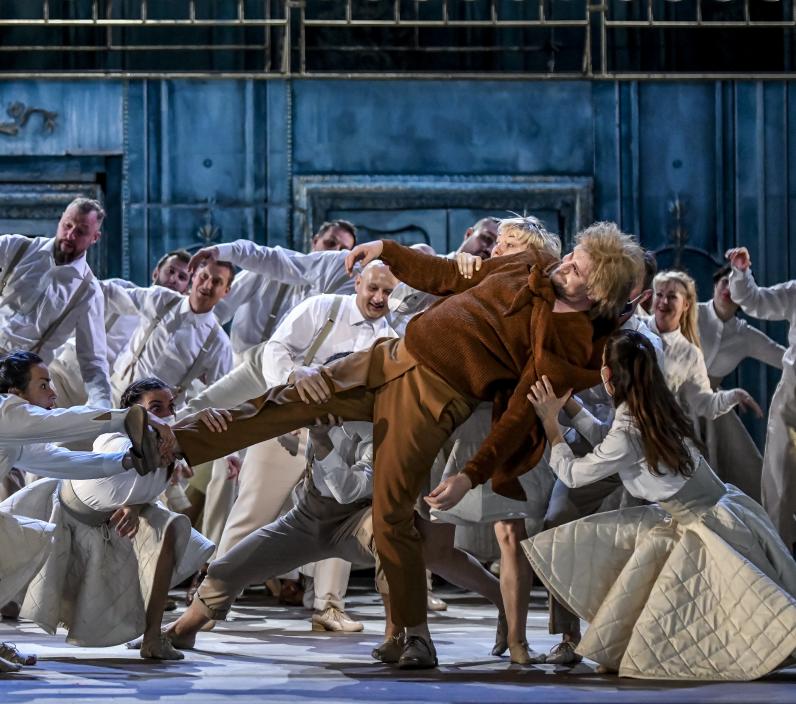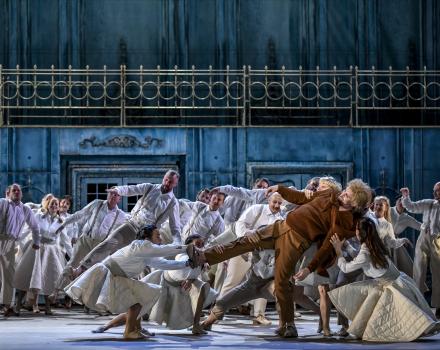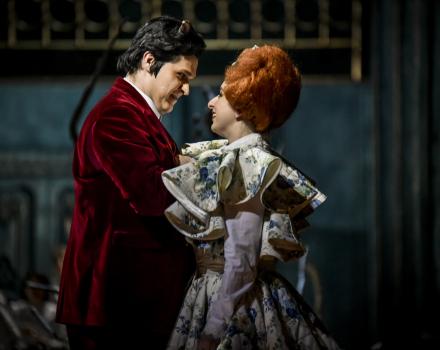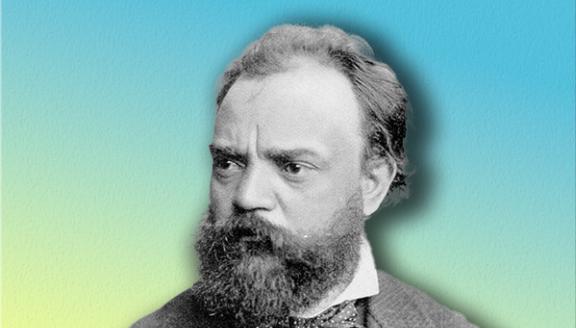
Nobody wants to dance with the quirky and a little cheeky Káča (Kate) at a party. Angry, she declares that she would dance with the Devil. So when he arrives as the dashing Marbuelo, she is swept off her feet down to hell. With the help of the clever Shepherd Jirka, will Káča make it back to earth? Might the Devil actually be relieved to see the back of his garrulous and feisty visitor?
Dvořák wrote The Devil and Kate just before Rusalka at the height of his powers as an orchestral composer and at a period of keen interest in fairytale and mythological themes. There is much purely instrumental music partly justified by the story with its emphasis on dancing in the Act I pub scene and in hell. There are also surprisingly long scene-preludes, including a striking descent to a Nibelheim-like hell at the beginning of Act II. It is one of the few Czech operas to lack love interest altogether: Káca declares at the end of Act III that, now she has been richly rewarded for scaring off the Devil, she will be able to afford any bridegroom she likes. The Devil and Kate is one of Dvořák’s most popular operas in his home lands and is based on a fairy tale by Božena Němcová. Most Czech devils are comically incompetent; Marbuel is especially so, and is outwitted by one of the most assertive of all the strong women depicted in Czech opera. This joyous story full of movement and humour is staged by young director Zuzana Fischer, beautifully blending traditional fairytale and contemporary worlds, in OperaVision’s first stream from Slovakia - in the National Theatre’s new venue in Bratislava.
CAST
|
Kate
|
Katarína Hano Flórová
|
|---|---|
|
Kate’s mother
|
Jitka Sapara Fischerová
|
|
Shepherd Jirka
|
Peter Račko
|
|
Devil Marbuel
|
Michal Onufer
|
|
Princess
|
Jolana Fogašová
|
|
Lucifer
|
Peter Mikuláš
|
|
Chambermaid
|
Andrea Vizvári
|
|
Devil Porter
|
Martin Morháč
|
|
Devil Watchman
|
Vladimir Streltsov
|
|
Musician
|
Jiří Zouhar
|
|
Marshal
|
Vladimir Streltsov
|
|
Chamberlain
|
Emil Leeger
|
|
Orchestra
|
SND Opera Orchestra
|
|
Chorus
|
SND Opera Chorus
|
| ... | |
|
Music
|
Antonín Dvořák
|
|---|---|
|
Text
|
Adolf Wenig
|
|
Conductor
|
Jaroslav Kyzlink
|
|
Director
|
Zuzana Fischer
|
|
Sets & Costumes
|
David Janošek
|
|
Lights
|
Daniel Tesař
Jan Tranta
|
|
Choreography
|
Tereza Kmotorková
Zuzana Lisoňová
|
|
Chorus master
|
Zuzana Kadlčíková
|
|
Dramaturgy
|
Jozef Červenka
|
| ... | |
VIDEOS
STORY
Act I
Country inn. The opera begins in an early summer evening on the terrace of a country inn. Today there is a festival of consecration of a local church: music, jolly mood, dance music plays cheerfully. The tipsy Shepherd Jirka does not feel like leaving the festivities to go to work for the loathed chamberlain of the princely estate. He sings a song about three lost sheep. Yet, he quickly runs away at the appearance of the loud-mouthed Káča and her mother. Káča want to dance with someone but as no one is interested. She is so upset that she declares herself ready to dance with the devil. Soon an unknown stylish hunter arrives – the Devil Marbuel in disguise. He asks around the villagers how they are doing and whether they are content with their lordships. He is pleased to learn that the Princess and her Chamberlain are tormenting their subjects: ‘To hell with them!’ Marbuel walks over to Káča and asks her to dance. They spin in a wild dance and Marbuel starts talking her into leaving with him. Meanwhile, Jirka returns – the Chamberlain wanted to beat him. He didn't let him, so he got fired. Marbuel invites Káča to his quarters in the red castle. She agrees and they fall into hell accompanied to thunder and lightning. The Mother complains about the fate of her daughter and Jirka offers to bring Káča back. He vanishes underground too.
Act II
Hell. In the great black hall of hell, devils keep drinking, playing cards and singing tributes to gold and the passion for gambling that seduces human souls. Lucifer arrives, angry at the overly noisy hellhound, and motions Devil the Porter to send Marbuel to see him as soon as he returns from earth. Marbuel stumbles in, though not with the Princess and her Chamberlain for whom he was sent. Marbuel carries Káča; she protests loudly (and with her fists) that she has been tricked by him. In desperation, he begs Lucifer to relieve him of his burden. Even the powerful ruler of hell would not have been able to deal with her, had it not been for the brave Jirka who now appears. He advises Lucifer to lure Káča away with golden chains. Although free of his burden, Marbuel must take Káča back to the world in punishment for not having fulfilled the task with which he was entrusted. He asks Jirka for help and promises to reward him handsomely: after a month, Marbuel will pretend to be after the Chamberlain, whom Lucifer granted a grace period to start behaving. Jirka will pretend to be his saviour from hell and ask him for a sack of gold. At midnight, Marbuel is to take the Princess to hell, yet Jirka is not to help her, else it might cost him his life. The Shepherd agrees. The devils throw a feast and dance. Jirka grabs Káča and they dance together out of the gate of hell.
Act III
The castle. In the magnificent castle hall, the Princess regrets having lived a revelling life: she came to realise that, for her sins, she had fallen in hell. In horror, she now fears that the devil will come and get her at midnight. Her Chambermaid is trying to reassure her that Jirka will no doubt save her from hell: after all, he succeeded in the case of the Chamberlain. The Princess is anxious. She sent for the Shepherd in the morning, yet the sun has long set since and there is still no sign of him. He does come ultimately, though he refuses to help the vicious ruler who has done so much evil. Only when the Princess promises to abolish his servitude, Jirka prepares a welcome for the devil. He brings Káča along, and they hide in the adjacent chamber. Marbuel appears. Jirka warns him that Káča is in the castle and is keen on taking revenge on him for deceiving her. As is often the case with hellish gifts, gold chains have turned into dry leaves. Káča shows up promptly and the terrified Marbuel flies out the window. The Princess is saved. In an effort to become a kinder soul, she appoints Jirka as her first minister. She gives Káča the most beautiful house in the town and ample money so she can choose her groom by herself. The story ended happily, and the liberated village folk celebrated the Princess and her new minister.
GALLERY


















